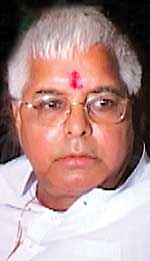 The assumption that India's foreign policy is affected by the changing of the guard in New Delhi is probably true, but in our exaggerated sense of self-worth, we often forget that Nepal is not a priority in New Delhi.
The assumption that India's foreign policy is affected by the changing of the guard in New Delhi is probably true, but in our exaggerated sense of self-worth, we often forget that Nepal is not a priority in New Delhi. On the foreign policy front, Natwar Singh and JN Dixit have much more pressing concerns to address: calm the nerves of international investors, recalibrate Indo-American cooperation, reconfigure relationship with China, fine-tune the peace process with Pakistan and search for a more effective role in Sri Lanka.
In all probability, South Bloc's Nepal policy will continue to be dominated by its babudom, which seems determined to let this country stew in its own juice for a while longer. Rather than debate the impact of the Indian electorate's dramatic turnaround, it may be more important for us to pick tips from a maturing democracy.
The poor, the marginalised, and the oppressed of Bharat delivered a powerful knock on the Shining India elite. There is a lesson for our own free-market fundamentalists: growth without justice is inherently unsustainable.
Telangana's destitute cotton farmers gave a crushing blow to CEO Chandrababu Naidu in Andhra Pradesh. Voters in Karnataka fired their digital neta, SM Krishna just as they had shown the door to Digvijay Singh in Madhya Pradesh earlier.
King Gyanendra needs to be wary of those who suggested to him in Gokarna on Monday that he can run this kingdom like a business enterprise with hand-picked technocrats reporting directly to him. The king can learn a lot from Sonia's theatrics but the COO model isn't one of them.
In the badlands of Bihar and West Bengal, ruling coalitions of Lalu Yadav and Jyoti Basu romped home comfortably, proving the old adage of politics that it's neither reality nor possibility that wins on the day of reckoning. Factors that swing the voters in electoral politics are identity and hope. The UML must get some more madhesis in its politburo and the Nepali Congress needs to re-invent its socialist past if these political parties want to have a fighting chance at the polls that King Gyanendra's loyalists may conduct in future.
The impressive show of the Sonia Congress in India and the better-than-average performance of various left parties extends Brazil's Lula phenomenon. The colour of the 21st century is going to be pink with state policies veering towards left of centre. All the more reason for a mainstream party like the UML in Nepal to break itself from its Stalinist past and pursue the path of Bahudaliya Janabad pioneered by Madan Bhandari, whose 10th death anniversary we mark this week (see p2).
Here, too, political scions Prakash Man Singh, Bimalendra Nidhi, and Sagar Shamsher and intellectuals Minendra Rijal, Prakash Sharan Mahat and Narayan Khadka of Sher Bahadur Deuba's political outfit need to venture out into the hinterland if they want to resume their roles as policymakers.
The widely held view is that opinion polls in the Indian media got it all wrong. In reality, the media simply lost the game by imposing their wishes upon the masses. India Inc's new media is unabashedly capitalist. It had a vested interest in designing a rightist victory. The talking-heads were trying their best to create an atmosphere of victory for their sponsors. The Indian electorate saw through their game and beat them at it. All these worthies are now eating their words sheepishly, trying to prove that they were knaves and fools.
Consumers of the Nepali media shouldn't be too taken in by self-proclaimed neutral journalists. A media-person who professes not to have a mission is probably on a commission to serve the status quo. So take the opinions of talking-heads, including this one, with a pinch of salt. We all have our biases. It's just that some of us are rather poor in hiding them.



